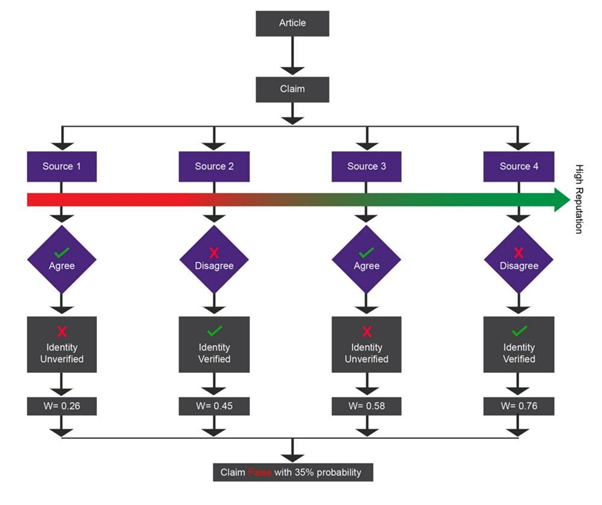|
Getting your Trinity Audio player ready...
|
Social media is evolving, shifting from a parasitic business model where third parties sell data that isn’t even theirs, to one where users have more choices—and more control.
‘Eyespace’ for sale
If you want to really know someone inside-out, skim through their Google searches.
In fact, Google and Facebook may know more about you than you do—they have a timestamped database of your online history to back it up. I would argue that not giving a f*ck might work. But this is easier said than done.
Some histories are quite harmless, like the fact that you’ve been checking out hotels in Phuket, checking out ICOs, or that you like watching blackhead extractions on Youtube. But some are far more intimate, such as hourly accounts of where you’ve been the last 12 months, a bump or rash “somewhere” that’s been bothering you, the kind of porn you like.
With ad targeting a well-known fact, it’s easy for others to make up what you look at in your private hours based on what ads they see in your pop-ups. Ad blockers come in handy, particularly in saving you from embarrassment at work.
But ad blockers on or not, somebody holds your diary—one you did not write, or ever even wanted to write.
Dylan Curran, a writer for The Guardian, argued that using a web browser’s incognito mode “isn’t nearly as private as you think,” and that clearing your cache only clears it on your device’s end—not on your ISP’s end, or on Google’s. “That’s the key: other people who use this device can’t see the activity. That doesn’t mean that no one can see the activity, only someone using the incriminating device,” he wrote.
He adds that even VPNs are not safe.
“…the VPN you’re connecting to also tracks what you’re doing, and has evidence of your searches and visited websites. With the right letter from law enforcement, your browsing history could be handed out like free samples at Walmart.”
In a Twitter thread, Curran laid out a disturbing trip down memory lane—except he’s not reminiscing in the privacy of his head. These are information on him that Facebook and Google stored. Read through his thread below.
Want to freak yourself out? I'm gonna show just how much of your information the likes of Facebook and Google store about you without you even realising it
— Dylan Curran (@iamdylancurran) March 24, 2018
It doesn’t help that this entire privacy intrusion is all being done for the sake of selling your attention, or renting out your “eyespace” to advertisers. It comes into debate whether the “free” service social media platforms offer is worth the trade-off, where they basically sell what’s yours. In some ways, selling something that isn’t theirs to begin with feels parasitic.
Blockchain and Social Media: Monetization of Attention
There are already some Internet browsers that promise not to track your activities. Even Chrome, Firefox, and Safari have a “do not track” feature. But then there’s social media, where a lot of us go on a binge search and watch.
Every time Facebook rolls out an update, it gains even more dominance over your online usage. Its “up next” mechanism for videos makes sure you waste as much time as possible right then and there, and the marketplace and search bar is starting to compete with Google. Then we go back to square one: Facebook doesn’t have a “do not track” feature.
It would be wonderful if Facebook had an opt-out feature for ads, much like most free mobile apps. Better yet, an opt-out from data mining. But with user data as the multi-billion dollar social media giant’s bread and butter, it’s unlikely they will give that up for a monthly fee.
Social media and content platforms like Youtube monetize themselves from activity, and there will be no activity without content—which users create. In a pledge to bring users back control over their data, the promised “Web 3.0,” some companies have vowed to “do social media right.” And blockchain technology has been heralded as the primary candidate to fixing the “broken Internet.”
Apart from payments and rights management, blockchain tech can be used to limit the need to input personal information repetitively into different websites. It can also be used to allow, or deny, access to information, although the implementation of such a permission system for a user’s entire internet experience may be far from a reality at this point.
Sapien Network: a better Reddit?
The value of data has quickly gained recognition. And companies are trying to give back users control over monetization of both their data and attention. In fact, a project called Docademic aims to bring free healthcare to people in exchange for their data. While health data is one of the most sensitive and private information about a person, if a person is directly compensated with appropriate healthcare services, I don’t think it’s such a bad trade-off especially if this data will aid scientific research. After all, they will be supplementing that data to their healthcare provider anyway, even when they pay for the service.
Blockchain technology is helping enforce a more fair exchange between providers and users. In the social media and public content space, platforms like Steemit and Yours integrated blockchain-based rewards systems to compensate content creators directly for their work.
I also came across a start-up called Sapien Network, which aims to create a better social media ecosystem by realigning the incentive structures. I reached out to them and got a response from Christopher Lee, head of PR at Sapien Network, who explained to me how their solution is better than other content platforms.
“What we are trying to create with Sapien is a tokenized, decentralized, reputation-based social news platform that not only will reward users for quality content, but also let them share ad revenue and fight fake news. No other platform is taking this route to fundamentally disrupt existing mass-market platforms,” Lee said.
According to Lee, their value proposition is already gaining much attention from users on Reddit—which has been a hub for blockchain and cryptocurrency discussions. But despite being a dominant platform where people can get slightly better debates than they’d find on Facebook, Reddit has been plagued with accusations of censorship.
“As for Web 2.0 platforms, we’re hoping to take a stab at Reddit’s market share – already we’ve gotten hundreds of signups from Redditors looking for a more transparent platform. The key is to build Sapien to make it undeniably better than any existing offering. We truly believe we can do this with a powerful utility token that underpins a more democratic platform that empowers its users,” Lee explained.
Sapien vs Facebook
Being already an established social media giant, Facebook obviously has a massive headstart. I wondered whether a quick switch in business model for Facebook would rock Sapien Network’s boat.
“Not necessarily,” Lee affirmed. “Facebook has been currently neck deep in their own battles outside of their business model. Aside from their privacy issues highlighted by the Cambridge Analytica Scandal, they are also dealing with fake accounts, fake news, and an aging demographic.
Their platform is already intertwined with privacy issues and fake news that users are looking for other alternatives that are much more transparent to fill their social media needs. A significant portion of their business model comes from ad revenue and they have ridden that to become a billion dollar company. It would be difficult to imagine they would diverge and give that up.
Also, Sapien’s users are rewarded for their contributions to the platform and will be able to control their data.”
Fake news
According to their website, the network also helps fight fake news. Knowing how convoluted social media users are, I asked:
“You say that you are building a network where fake news is purged out. But as far as I’ve seen, social media users have a tendency to vote down what they don’t like—not necessarily what isn’t true. In fact, they would vote down anything that goes against their opinions and convenient ‘truths’—even when that means they will be siding with fake news. This is an unfortunate human tendency that has been rampant on Twitter and Facebook and is absolutely difficult to solve. What makes you think you’ll do better in building this ideal online society?”
“Sapien will combat and purge fake news with a unique reputation system and our Proof of Value Protocol,” Lee said.“Contributions made by users, publishers, and businesses on the Sapien platform will be stored in the SPN token with a reputation score. All users will start out with a reputation score of one. Then, depending on the value the user adds to the platform, this score can be positively or negatively impacted. When quality contributions are evaluated positively, a user’s reputation within a community will increase; low-quality posts and comments will lower a user’s reputation. Reputed users will be delegated more “power” on the platform, allowing them to have a greater say in what qualifies as valuable contributions within their respective communities.
The Proof-of-Value protocol is our approach to distinguish and reward valuable content while preventing the spread of fake news and content that does not align with the values of the community. Sapien has enlisted the help of one of their partners, DAOstack, to help engine our community consensus system in this protocol.
See the accompanying graphic below for how Proof-of-Value works.”

So what’s the catch?
One question many would ask, of course, is how they earn money. If they’re not selling user data, how does Sapien Network keep their operations going?
“Our business model currently consists of two elements that will help keep operations going. One is the Marketplace and the other is Ad Revenue,” Lee said.
“For the Marketplace, Sapien will charge a 1% transaction fee to buyers and sellers, however, staking an equivalent of at least $20 worth of Sapien will waive the transaction fee. If either party stakes less than that minimum threshold, they will be charged the 1% transaction fee.
Advertisers will be able to purchase ads and have them served to users who have opted into seeing them. A substantial discount will be offered to advertisers purchasing ads with SPN tokens. The advertising experience will be similar to the existing social platforms except that a majority of the ad revenue will be distributed to users in our Ad Revenue Sharing program which you can read about here. On Sapien, users who opt into seeing ads are rewarded for sharing their data with advertisers.”
Community Control
Since this is a decentralized network with a pledge to “democratization,” does that mean that they will completely abandon control and leave the community to make judgements on content? What happens if, hypothetically, a piece of misleading content with potential grave repercussions (think Bitconnect’s marketing scam, hate speech, etc.) becomes popular, and continues to circulate despite the consequences?
“Sapien will almost be entirely hands off on how communities are run and operated by the leaders or the admins. This aligns with our Free Speech core value where almost any topic can be discussed without censorship as long as it is deemed LEGAL.
One example would be if CoinGeek migrates their followers over to Sapien. They would have full control over the content, rules of the community, and any paywalls that are implemented in that group. Any bad actors or trolls will be dealt with by that community either using a tribunal or an outright ban. Unless detrimental to the platform or as requested by the leaders of the community, Sapien will not step in to help govern the community and/or implement rules to keep everything in place. DAOstack will also be helping us here to build an innovative system of self-governance for communities on Sapien.
To create a truly autonomous social platform, users must have real power over the direction of the platform. Thus, one of the capabilities of the SPN token will be to give users a voice through our innovative proposal system. This will allow users to participate in organizational decisions, feature developments, and marketplace rewards. SPN stakeholders will be in a unique position to suggest and prioritize milestones on our project roadmap.
With the first autonomous, decentralized social platform, we can cultivate a passionate and engaged community that has the ability to change its values over time. In addition, SPN will enable users to vote on proposals within a branch, facilitating democratic decisions at a community level. Ultimately, this will enable branches to self-moderate, without the need for authoritative moderators that are the norm on similar platforms.”
The future of social media
Lee says that social media is evolving, with better focus on user control, identity protection, and content integrity.
“The evolution of social media is under way with the crackdown on fake news, fake users, and privacy issues. This will be addressed with users and content creators having much more control over their social media experience instead of entrusting it with a third party. Data is essentially the new gold and these third parties are using it to make billions. That’s billions with a ‘B.’
Civic, another partner, will be assisting the Sapien team in allowing users of the platform to better control their data and protect their identities. The community will be be able to use the platform anonymously or opt-in to sharing their data with advertisers.
Also, users don’t get rewarded for using the platform and providing value. Blockchain and decentralization will definitely look to play a role in making the playing field more fair and rewarding the users and content creators for the value they provide to the community.
As people become more aware of their own privacy and personal data, social media platforms will play an important role in the future of human interaction. It will give users back control. As a result, communities will get a true gauge of social opinion through free speech and expression and the full authority of how their data and content is shared and distributed,” Lee said.

 02-16-2026
02-16-2026 




